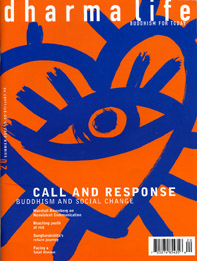Westward Dharma
Buddhism beyond Asia
Ed. Charles Prebish and Martin Baumann
University of California Press 2002, $21.95/£15.95 p/b
The manifold processes involved in developing western Buddhism are of interest to Buddhist scholars and practitioners alike and this collection of 23 essays seeks to survey the field. Both of its editors are longstanding scholars of western Buddhism.
The collection is in five parts. The first gives a profile of Buddhism outside Asia and the changes arising for western 'convert' sanghas. It identifies these as democratisation; de-emphasis on monasticism and aspects that are considered essentially features of Asian culture; an increasing role for lay people; and attempts to develop gender equality among practitioners. It also notes an increasing interest in the study of global Buddhism that bodes well for its future. The second part looks at case studies of several countries in considering the spread of Buddhism outside Asia.
Perhaps it is the final three parts of the book that are likely to be of most interest to practitioners. The third part starts with a moving history by Duncan Ryoken Williams of Buddhism's role in supporting Japanese-Americans when they were interned during the Second World War. Douglas Padgett's essay then considers diaspora sanghas in Florida and strongly challenges the usual image of diaspora sanghas as merely being static transmitters of cultural and ethnic traditions. He shows that like convert sanghas, diaspora sanghas, too, are engaging in a process of adaptation and change. David McMahan's essay shows how Zen in the West is often stripped of its cultural and socio-historical context in the process of translation and the potential difficulties arising from this.
Sandra Bell's account of 'Scandals in Emerging Western Buddhism' is sympathetic and insightful. Her two case studies outline the processes by which scandals within sanghas came to light and how the resulting fallout was managed. As well as giving a good analysis of the potential causes of such problems, she illustrates how attempts are being made to address these through reducing emphasis on the charismatic authority of individual teachers and on more collective styles of leadership.
Part four on 'Lifestyle: Being a Buddhist in Western Societies' starts with a strong essay called 'The Challenge of Community' by Ajahn Tiradhammo. Although it focuses on his experience of monastic communities, it has wider relevance for sanghas generally – especially for those with residential communities – in its exploration of group dynamics. It also gives a good account of issues of hierarchy and the potential for leaders to become isolated and burnt out. Gil Fronsdal's essay on ethics in the Vipassana movement makes worthwhile reading, too.
However, after an interesting essay by Karma Lekshe Tsomo on the challenges facing Buddhist nuns, I found Sylvia Wetzel's essay 'Neither Monk nor Nun: Western Buddhists as Full-Time Practitioners' disappointingly simplistic in stereotyping western women as the new vanguard for developments among Buddhist teachers.
The final part, 'Buddhism facing New Challenges', starts with an essay by Judith Simmer-Brown on women in Buddhism that is free from the failings in Wetzel's piece. Christopher Queen, a major scholar in the field, gives a good account of the development of socially engaged Buddhism. And Franz Aubrey Metcalf's essay on the encounter of Buddhism and psychology is a wake-up call to those involved in this area. Showing the strong tendency of western culture to 'powerfully [appropriate] Buddhism as psychology', he urges further research so that 'the encounter between psychology and Buddhism avoid[s] diminishing Buddhism in the West'. Ian Harris's historical essay on Buddhism and art is also of interest.
As a western Buddhist scholar-practitioner I found Westward Dharma interesting and worthwhile. It is refreshing to see consideration of diaspora sanghas as well as convert sanghas, although it would also have been good to see insider views of these traditions. It is useful at this time for Buddhists outside Asia to stand back and take a more objective look at themselves and their project of developing sanghas in the West. Westward Dharma gives an accurate and sympathetic picture of the issues facing the broader world of Buddhism outside Asia and will repay reading and reflection by scholars and practitioners alike.
Sharon Smith is researching the development of western Buddhism in multicultural and multiethnic societies at Goldsmiths' College, London



